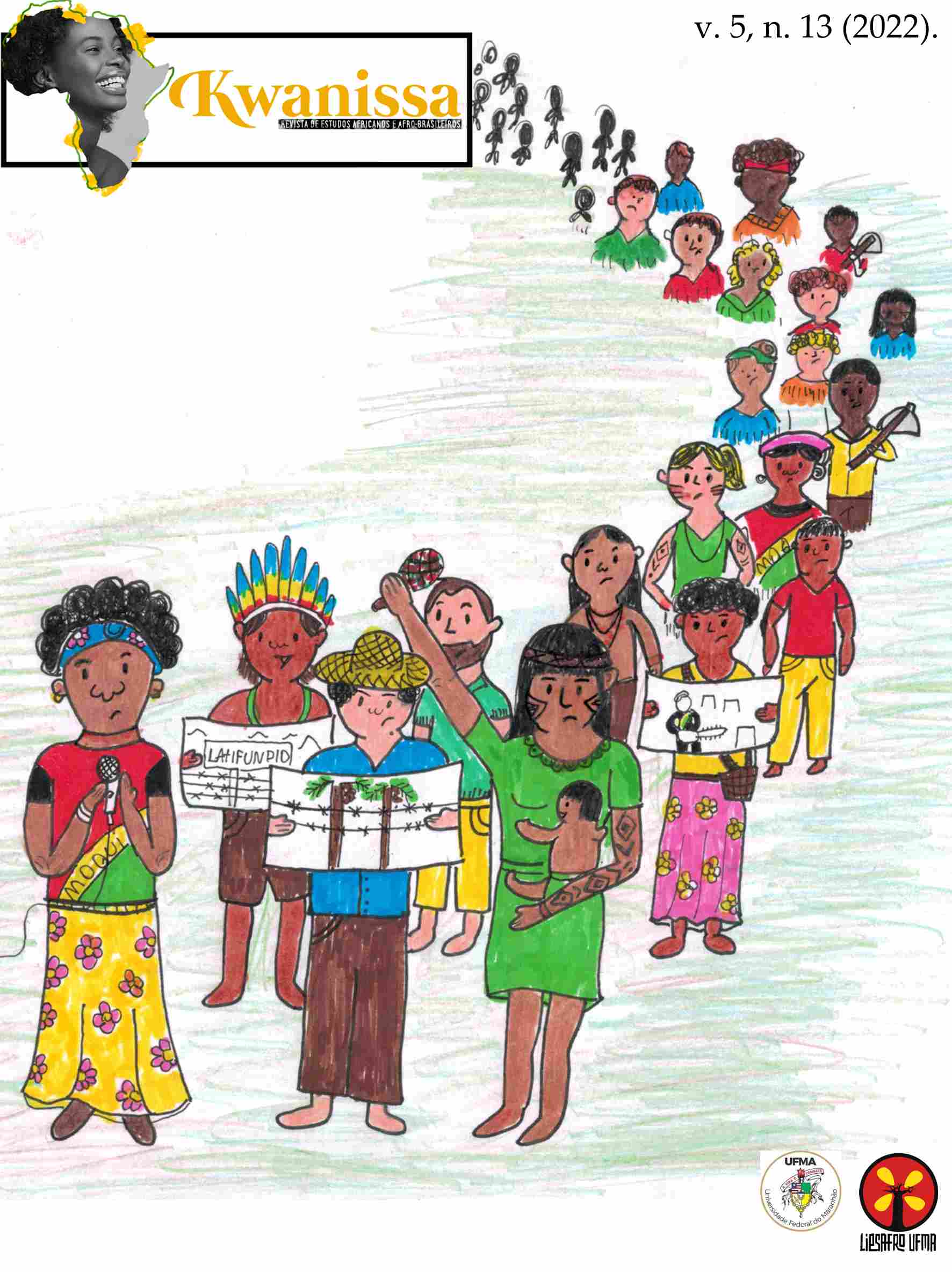MATRIARCHY VERSUS PATRIARCHY
an epistemological collision
DOI:
https://doi.org/10.18764/2595-1033v5n13.2022.24Keywords:
Matriarchy, Patriarchy, Epistemology, CosmoperspectiveAbstract
This paper intends to analyze, albeit in a preliminary way, the relations between matriarchy and patriarchy in the African context. The subject has always been controversial. The two systems are different social organizations. In the African context, some literatures shows that patriarchy preceded colonization but took on new contours with the colonial invasion, while others, while recognizing gender inequalities and asymmetries, point to patriarchy as a result of the European colonial invasion. With the evolutionist theories, matriarchy is described as the inferior phase of human civilization, being considered by the ethnocentric Western view, as a status of barbarism and savagery. Methodologically, the research is of a descriptive and analytical nature, of bibliographical character. Therefore, unlike the Western patriarchal worldview, the idea of filiation in matrilineal societies is calculated through the maternal line and not the paternal line. In them women are not associated with subjection, but with economic stabilization, the security of collectivity, and the guardians of provisions. In societies where matriarchy has not been altered by colonialism, patriarchy, and other exogenous factors, women continue to have great powers and transmit public law in their society.
Downloads
References
ADESINA, Jimi. Práticas da Sociologia Africana: Lições de endogeneidade e género na academia. In: SILVA, Teresa Cruz; COELHO, João Paulo Borges; SOUTO, Amélia Neves de. (Orgs). Como fazer ciências sociais e humanas em África: questões epistemológicas, metodológicas, teóricas e políticas: (textos do Colóquio em Homenagem a Aquino de Bragança). Dakar: CODESRIA, 2012.
BAKARE-YUSUF, Bibi. Além do determinismo: A fenomenologia da existência feminina Africana. Tradução para uso didático de BAKARE-YUSUF, Bibi. Beyond Determinism: The Phenomenology of African Female Existence. Feminist Africa, Issue 2, 2003, por Aline Matos da Rocha e Emival Ramos.
CARVALHO, Ricardo Ossagô; TUBENTO, Medilanda Eliseu Amós. Matriarcado africano: uma análise nos escritos dos feminismos. Tensões Mundiais, v. 17, n. 33, p. 305-328, 2020.
CHAGAS, Waldeci Ferreira. A condição da mulher na África tradicional. In: Anais do III Seminário Nacional Gênero e Práticas Culturais, olhares diversos sobre a diferença. João Pessoa, 2011. Disponível em: https://bit.ly/3ddOv4Z. Acesso em: 29 jun. 2022.
CHIZIANE, Paulina. [Testemunho]. Eu, mulher.... Por uma nova visão do mundo. Abril–NEPA/UFF, v. 5, n. 10, p. 199-205, 2013.
D’EAUBONNE, Françoise. As mulheres antes do patriarcado. Lisboa: Editorial Veja, 1977.
DIOP, Cheikh Anta. A unidade cultural da África negra: esferas do patriarcado e do matriarcado na antiguidade clássica. Luanda, Mulemba, 2014.
GARAUDY, Roger. Libertação da mulher, libertação da humanidade. Rio de janeiro: Zahar editores, 1982.
MAZRUI, Ali A. A mulher na economia africana. Finanças & Desenvolvimento, v. 12, n. 2, p. 42-43, 1992.
MORGAN, Lewis Henry. A sociedade antiga: ou investigações sobre as linhas do progresso humano desde a selvageria, através da barbárie, até a civilização [1877]. In: MORGAN, Lewis Henry. Evolucionismo cultural/textos de Morgan, Taylor e Frazer; textos selecionados, apresentação e revisão, Celso Castro; tradução, Maria Lúcia de Oliveira. Rio de Janeiro, Jorge Zahar Ed., 2005.
NASCIMENTO, Elisa Larkin. As civilizações africanas no mundo antigo. In: NASCIMENTO, Elisa Larkin. (Org.) A Matriz africana no mundo. São Paulo: Selo Negro, 2008.
OLIVEIRA, Jacqueline. O papel da colonização africana na percepção do corpo da mulher negra: uma leitura de O Alegre Canto da Perdiz. Revista Satori. 2015.
OYĚWÙMÍ, Oyèrónké. Conceituando o Gênero: os fundamentos eurocêntricos dos conceitos feministas e o desafio das epistemologias africanas. Tradução para uso didático de: OYĚWÙMÍ, Oyèrónké. Conceptualizing Gender: The Eurocentric Foundations of Feminist Concepts and the challenge of African Epistemologies. African Gender Scholarship: Concepts, Methodologies and Paradigms. CODESRIA Gender Series. Volume 1, Dakar, CODESRIA, 2004, p. 1-8 por Juliana Araújo.
SCHOLL, Camille Johann. Matriarcado e África: a produção de um discurso por intelectuais africanos: Cheikh Anta Diop e Ifi Amadiume. 2016. 54f. Trabalho de Conclusão de Curso (Graduação em História) – Instituto de Filosofia e de Ciências Humanas, Universidade Federal de Rio Grande do Sul, Porto Alegre, 2016.
SCHOLL, Camille Johann. Matriarcado e África: discursos na história acerca de poder político e gênero. In: FONSECA, Mariana Bracks; OLIVEIRA, Fernanda Chamarelli de. (Orgs.) África e suas relações de gênero. Rio de Janeiro: Edições Áfricas, p. 155-184, 2019.
SILVA, Vinicius da; LONDERO, Josirene candido. Do matriarcalismo ao patriarcalismo: formas de controle e opressão das mulheres. Anais do XII Colóquio Nacional de Representações de Gênero. Campina Grande, 2016. Disponível em: https://bit.ly/3wPP50z. Acesso em 23 jun. 2022.
SOUZA, Rodrigo. A família africana como base do pan-africanismo. [Online]. 2019. Disponível em: https://bit.ly/3jqo4ZT/. Acesso em: 30 ago. 2020.
Downloads
Published
How to Cite
Issue
Section
License
Copyright (c) 2022 Kwanissa: Revista de Estudos Africanos e Afro-Brasileiros

This work is licensed under a Creative Commons Attribution-NonCommercial 4.0 International License.
Direitos autorais Kwanissa: Revista de Estudos Africanos e Afro-Brasileiros
Este obra está licenciado com uma Licença Creative Commons Atribuição-NãoComercial-SemDerivações 4.0 Internacional.











